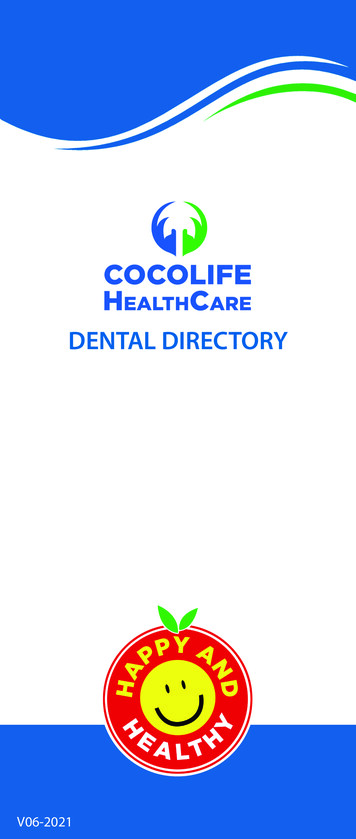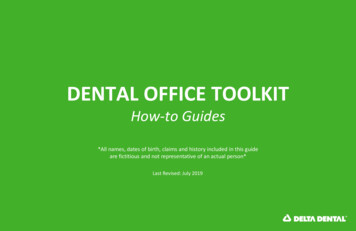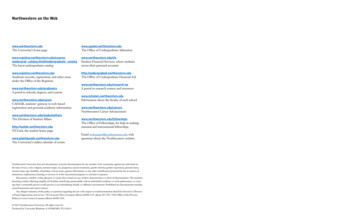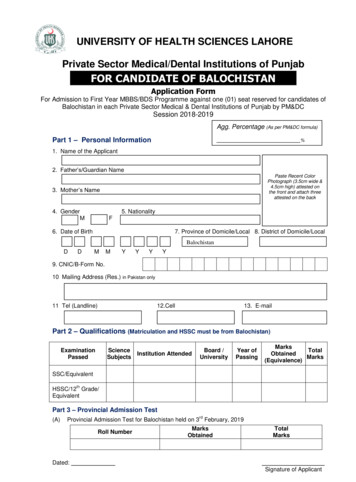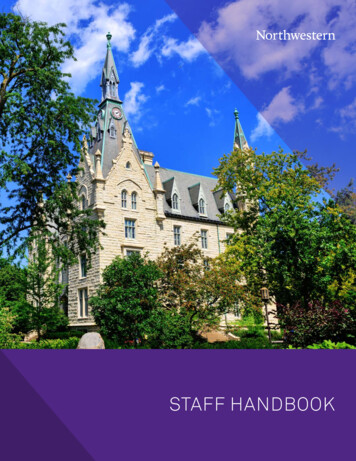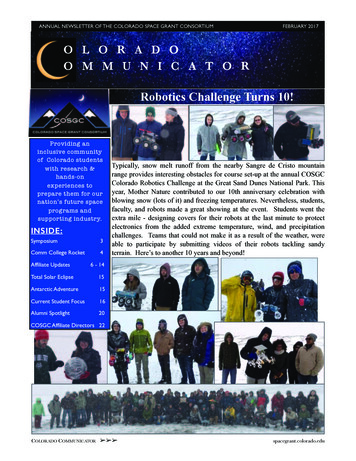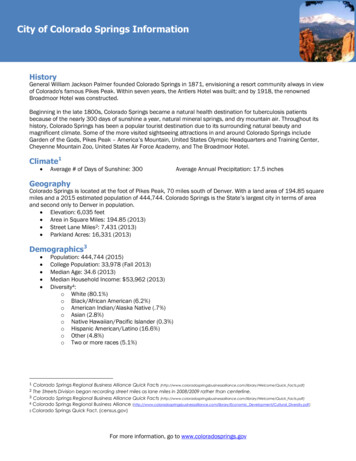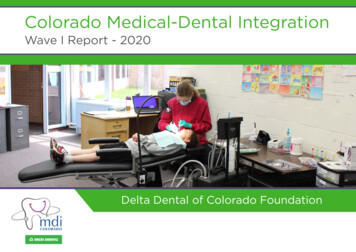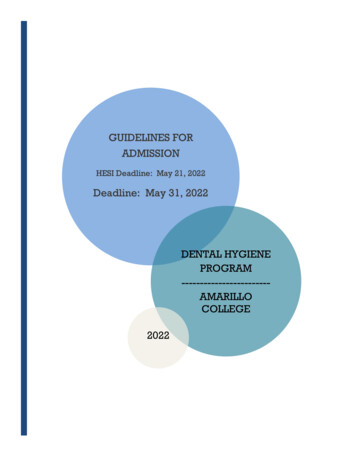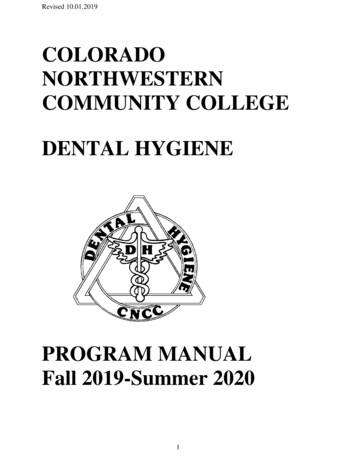
Transcription
Revised 10.01.2019COLORADONORTHWESTERNCOMMUNITY COLLEGEDENTAL HYGIENEPROGRAM MANUALFall 2019-Summer 20201
Revised 10.01.2019TABLE OF CONTENTSSECTION I Policy and ProcedurePAGE 4FACULTY MISSION STATEMENT5DENTAL HYGIENE ESSENTIAL FUNCTIONS7DENTAL HYGIENE PROGRAM COMPETENCIES9LICENSURE REQUIREMENTS13CNCC PROGRAM POLICIES & PROCEDURES14REMEDIATION/ TERMINATION POLICY17FAILING OR AT RISK STUDENTS “STAFFINGS”19CRITICAL INCIDENTS25CLINICAL REVIEW BOARD28CONCERNS/GRIEVANCE CHAIN OF COMMAND32DENTAL HYGIENE SUDENT CODE OF CONDUCT33POLICY ON PATIENT CONFIDENTIALITY34DRESS CODE/ PERSONAL HYGIENE37GENERAL RULES/ REGULATIONS/ACADEMIC POLICIES40PATIENTS’ BASIC RECORDS, PROCEDURES AND FEES46RIFLE CORRECTIONAL POLICY56PROTOCOL FOR MEDICALLY COMPROMISED PATIENTS58CNCC STANDARD ABBREVIATIONS59SECTION II REQUIREMENTS AND CLINIC EVALS PAGE 61CLINIC REQUIREMENTSCLINIC REQUIREMENTS WORKSHEETCLINCI EVALUATION627074CNCC DAILY FEEDBACK AND DATA FORM77SUMMATIVE EVALUATION CRITERIACOMPONENTS OF PROFESSIONALISMEXAMINATION FLOW CHARTS7882862
Revised 10.01.2019SECTION III HAZARD COMMUNICATIONPAGE 88INFECTION CONTROL PROGRAM89POST-EXPOSURE INCIDENT MANAGEMENT94RULES AND REG. REGARDING IONIZING RADIATION96POLICY ON LABORATORY EMERGENCIES103POLICY ON MANAGING CLINIC EMERGENCIES105PREGNANCY PROTOCOLS108SECTION IV PROCESS EVALUATIONSPAGE 1123
Revised 10.01.2019COLORADONORTHWESTERNCOMMUNITY COLLEGEDENTAL HYGIENEPROGRAM MANUALSection I:Policies & Procedures4
Revised 10.01.2019DEPARTMENT OF DENTAL HYGIENEFULL-TIME FACULTYTiffany Douglas, RDH, MAED/AET Program DirectorKenneth Myers, DDS, Clinic Dentist/InstructorDebbie Ficken, RDH, BS, First-Year Clinic Coordinator/InstructorShelly Peters, RDH, BS, Second-Year Clinic Coordinator/InstructorPART-TIME FACULTYTrilby Elam, RDH, BS, Clinical InstructorMichelle Casto, RDH, Clinical InstructorJamie Rotunno, RDH, Clinical InstructorTori Keel, RDH, Clinical InstructorWhitney Fischer, RDH, Clinical InstructorSTAFFConnie Skelton, Clinic ManagerAngie Kenney, Administrative Assistant5
Revised 10.01.2019CNCC DENTAL HYGIENE FACULTY MISSION STATEMENTWe, the dental hygiene faculty at Colorado Northwestern Community College, believe that theeducational experience is a lifelong process.We believe our mission is to work effectively, together and with students, to provide aneducational setting where students have the opportunity to become dental hygienists who arepersonally, professionally, and socially effective.Students will understand that serving the needs of the public who seek treatment in our clinicinvolves respecting the individuality, dignity, and rights of every person regardless of race, color,creed, national origin, sexual orientation, and socioeconomic or medical/dental status.Graduates of our program will understand that dental hygiene is a multifaceted health profession.As a member of that profession they are expected to serve the public competently whether as aclinician, educator, consumer advocate, researcher, manager, or change agent.ADDITIONAL STATEMENT REGARDING DISCRIMINATIONThe Dental Hygiene Department joins with the entire campus of Colorado NorthwesternCommunity College (CNCC) in prohibiting all forms of discrimination and harassment includingthose that violate federal and state law, or the State Board for Community Colleges andOccupational Education Board Policies 3-120 or 4-120. The College does not discriminate on thebasis of sex/gender, race, color, age, creed, national or ethnic origin, physical or mentaldisability, veteran status, pregnancy status, religion, genetic information, gender identity, orsexual orientation in its employment practices or educational programs and activities6
Revised 10.01.2019ESSENTIAL FUNCTIONS FOR DENTAL HYGIENEIn order to be admitted to or continue in the CNCC Dental Hygiene Program, a studentmust possess and demonstrate the skills and abilities outlined below. If a student isunable to perform in an independent manner, a Clinical Review Board will be convenedto determine whether the student needs to be dismissed from the program.STANDARDDEFINITIONEXAMPLES OF ACTIVITIESCommunicationCommunication abilities sufficient for effectiveinteraction with patients, instructors and othermembers of the healthcare team in verbal andwritten English.Able to obtain information, explain treatmentprocedures, initiate health education training, describepatient situations, perceive non-verbal communicationsand show empathy. Able to interact with patients froma variety of social, emotional, cultural, and intellectualbackgrounds & work efficiently in team environment.Critical ThinkingCritical thinking ability for clinical judgment.Identify cause-effect relationships in clinical situation;evaluate patient or disease responses; synthesize data;draw sound conclusions. Able to work effectively inemergency situations, efficiently handle bodily fluids,and manage stressful situations. Accept and utilizecriticism to improve to improve skills.MobilityAnd EndurancePhysical abilities (including standing, walking,bending, range of motion of extremities) tomove from room to room, tolerate detailedactivity intensity for extended periods, andmaneuver in small spaces.Able to administer cardiopulmonary resuscitation;move around in patient treatment area, remain seatedfor 60 minutes at a time while focused on patientcare, move hands and fingers in a small area whileperforming delicate procedures.MotorGross and fine motor function sufficient toprovide safe and effective dental hygiene care.Uses sharp dental instruments without injury to self orto patients; manipulate various dental materials.HearingAuditory ability sufficient to monitor andassess health needs.Able to listen to breath and heart sounds. Able to hearequipment monitors, such as x-ray equipment andautoclave timers. Ability to hear patient complaints anduse verbal information to clarify patient medicalhistory and diagnosis.VisualVisual ability sufficient to provide safe andeffective dental hygiene care.Able to observe patients and use instruments in the oralcavity. Adequate close vision to see small lesions anddeposits on teeth. Ability to see under low lightconditions including those in the oral cavity,darkrooms, and dental operatories.TactileTactile ability sufficient for physicalassessment and scaling skills.Able to perform palpation of a pulse, extraoral andintraoral structures, and feel and remove hard and softdeposits from teeth.TechnologyTechnological abilities sufficient to provideadequate record and documentation of dentalhygiene visits.Able to perform basic tasks on computer systemsincluding keyboarding for accurate record keeping,open/close of software programs for dental charting,radiology, or scheduling, and email use forcommunication with patients and other dentalproviders.7
Revised 10.01.2019CNCC Essential Functions:Dental Hygiene Essential Functions clarification:This form is to inform the student what qualities they must possess in order to besuccessful in the Dental Hygiene Program. We will keep you informed throughyour day sheet comments and verbal or written recommendations so that you willknow that you should seek further assistance and that your skills are not up tostandards. These are required essential functions and your skills must beimproving from semester to semester. If your skills continue to not improve ordecline you will be dismissed from the program since these are required skills. Acopy of the Essential Functions is in D2L in the content folder with the CourseSyllabus for all clinical courses.This form must be signed before you are allowed into clinic.Printed name:Sign:Date:8
Revised 10.01.2019Program CompetenciesForewordThe dental hygiene program’s ultimate goal is: Graduating students will perform at orabove the national average on their national and regional licensing exams. This documentdescribes the abilities expected of a dental hygienist entering the profession. The competencystatements were originally drafted by The American Dental Educators Association (ADEA),Section of Dental Hygiene Education Competency Development Committee, and presented in1998. CNCC has adapted these competencies to encompass the competencies we feel ourgraduates should possess.As an integral member of the healthcare team, a major role of the hygienist is to assistpatients achieve and maintain optimal oral health. We feel the competencies listed belowdescribe the desired combination of knowledge, psychomotor skills, communication skills, andattitudes, as well as the standards used to measure the hygienist’s independent performance.1.Program Competencies(C)The dental hygienist must possess the ethics, values, skills, and knowledge integral to all aspectsof the profession. These competencies are foundational to all of the roles of the dental hygienist.C.1Apply a professional code of ethics in all endeavors.C.2Adhere to state and federal laws, recommendations, and regulations in the provision ofdental hygiene care.C.3Provide dental hygiene care to promote patient health and wellness, and assumeresponsibility for dental hygiene interventions.C.4Use critical thinking and problem solving in the provision of evidence-based practice.C.5Continuously perform self-assessment for life-long learning and professional growth.C.6Advance the profession through service activities and affiliations with professionalorganizations.C.7Provide quality assurance mechanisms for health services.C.8Communicate effectively with patients, colleagues, and other professionals, both verballyand in writing.C.9Provide accurate, consistent, and complete documentation for assessment, diagnosis,planning, implementation, and evaluation of dental hygiene services.C.10Using an individualized approach provide equitable care to all patients that is humane,empathetic, and caring.9
Revised 10.01.2019II.Health Promotion and Disease Prevention (HP)Since Health Promotion and Disease Prevention is a key component of health care, changeswithin the healthcare environment require the dental hygienist to have a general knowledge ofwellness, health determinants, and characteristics of various patient communities. The hygienistneeds to emphasize prevention of disease as well as effective health care delivery.HP.1 Promote the values of oral and general health and wellness to the public andorganizations within and outside the profession.HP.2 Respect the goals, values, beliefs, and preferences of the patient while promoting optimaloral and general health.HP.3 Refer patients who may have a physiological, psychological, and/or social problem forcomprehensive patient evaluation.HP.4 Identify individual and population risk factors and develop strategies that promote healthrelated quality of life.HP.5 Evaluate factors that can be used to promote patient adherence to disease preventionand/or health maintenance strategies.HP.6 Evaluate and utilize methods to ensure the health and safety of the patient and the dentalhygienist in the delivery of dental hygiene treatment.III.Community Involvement (CM)The dental hygienist must appreciate his/her role as a health professional at the local, state, andnational levels. This role requires the graduate dental hygienist to assess, plan, implement, andevaluate programs and activities to benefit the general population. In this complex role, thedental hygienist must be prepared to influence others to facilitate access to care and services.CM.1 Assess the oral health needs of the community and the quality and availability ofresources and services.CM.2 Provide screening, referral, and educational services that allow patients to access theresources of the health care system.CM.3 Provide community oral health services in a variety of settings.CM.4 Facilitate patient access to oral health services by influencing individuals and/ororganizations for the provision of oral health care.CM.5 Evaluate reimbursement mechanisms and their impact on the patient’s access to healthcare.10
Revised 10.01.2019CM.6 Evaluate the outcomes of community-based programs and plan for future activities.IV.Patient Care (PC)Because the dental hygienist’s role in patient care is ever changing, yet central to themaintenance of health, dental hygiene graduates must use their skills to assess, diagnose, plan,implement, and evaluate treatment.AssessmentPC.1 Systematically collect, analyze, and record data on the general, oral, and psychosocialhealth status of a variety of patients using methods consistent with medicolegalprinciples.This competency includes:a.Select, obtain, and interpret diagnostic information, recognizing its advantagesand limitations.b.Recognize predisposing and etiologic risk factors that require intervention toprevent disease.c.Obtain, review, and update a complete medical, family, social, and dental history.d.Recognize health conditions and medications that impact overall patient care.e.Identify patients at risk for a medical emergency, and manage the patient care in amanner that prevents an emergency.f.Perform a comprehensive examination using clinical, radiographic, periodontal,dental charting, and other data collection procedures to assess the patient’s needs.DiagnosisPC.2 Use critical decision-making skills to reach conclusions about the patient’s dentalhygiene needs based on all available assessment data.This competency includes:a.Use assessment findings, etiologic factors, and clinical data in determining adental hygiene diagnosis.b.Identify patient needs and significant findings that impact the delivery of dentalhygiene services.c.Obtain consultations as needed.PlanningPC.3 Collaborate with the patient and/or other health professionals to formulate acomprehensive dental hygiene care plan that is patient-centered and based on currentscientific evidence.This competency includes:a.Prioritize the care plan based on the health status and the actual and potentialproblems of the individual to facilitate optimal oral health.11
Revised 10.01.2019b.Establish a planned sequence of care (educational, clinical, and evaluation) basedon: the dental hygiene diagnosis, identified oral conditions, potential problems,etiologic and risk factors, and available treatment modalities.c.Establish a collaborative relationship with the patient in the planned care toinclude etiology, prognosis, and treatment alternatives.d.Make referrals to other health care professionals.e.Obtain the patient’s informed consent based on a thorough case presentation.ImplementationPC.4 Provide specialized treatment that includes preventive and therapeutic services designedto achieve and maintain oral health. Assist in achieving oral health goals formulated incollaboration with the patient.This competency includes:a.Perform dental hygiene interventions to eliminate and/or control local etiologicfactors to prevent and control caries, periodontal disease, and other oralconditions.b.Control pain and anxiety during treatment through the use of accepted clinical andbehavioral techniques.c.Provide life support measures to manage medical emergencies in the patient careenvironment.EvaluationPC.5 Evaluate the effectiveness of the implemented clinical, preventive, and educationalservices and modify as needed.This competency includes:a.Determine the outcomes of dental hygiene interventions using indices,instruments, examination techniques, and patient self-report.b.Evaluate the patient’s satisfaction with the oral health care received and the oralhealth status achieved.c.Provide subsequent treatment or referrals based on evaluation findings.d.Develop and maintain a health maintenance program.V.Professional Growth and Development (PGD)Dental hygienists must be aware of a variety of opportunities for professional growth anddevelopment. Some opportunities may increase patient access to dental hygiene; others mayoffer ways to influence the profession and the changing healthcare environment. A dentalhygienist must possess transferable skills, e.g., in communication, problem-solving, and criticalthinking, to take advantage of these opportunities.PGD.1 Identify alternative career options within health care, industry, education, and research,and evaluate the feasibility of pursuing dental hygiene opportunities.PGD.2 Develop management and marketing strategies to be used in non-traditional health caresettings.PGD.3 Access professional and social networks and resources to assist entrepreneurialinitiatives.12
Revised 10.01.2019LICENSURE REQUIREMENTSGraduation from an accredited dental hygiene school does not automatically grant a graduate thelicense to practice dental hygiene. The graduate must prove competency in all areas of the dentalhygiene curriculum including dental sciences, preclinical and clinical sciences, practical skillsand state jurisprudence.State licensure varies from state to state. Each state has its own licensing board that sets therequirements for licensure and governs the practice of dentistry and dental hygiene in that state.Each state requires proof of competency in the dental hygiene curriculum. Fifty-one of the fiftythree licensing jurisdictions accept the results of the National Board Dental HygieneExamination in lieu of a local written examination. Colorado accepts the National Board DentalHygiene Examination results.The National Board Dental Hygiene Examination is developed and administered by theAmerican Dental Association's Joint Commission on National Dental Examinations. Thisexamination is a comprehensive written examination designed to show competency in the areasof dental science, preclinical and clinical sciences. The minimum acceptable level ofcompetency is 75%. This examination is offered to dental hygiene students during the lastsemester before graduation.In addition, each state requires that a prospective licensee show clinical competency through apractical examination. Colorado belongs to the Central Regional Dental Testing Service,(CRDTS) and accepts the results of their practical examination. CRDTS conducts a practicalexamination at CNCC each spring for any graduating dental hygiene student who wishes toparticipate.Most states also require the prospective licensee to pass a written examination on thejurisprudence of that state. Students wishing to take a State Board examination will beresponsible for requesting application information from that State Board of Dental Examiners.NOTE: Anyone who has been convicted of a felony, misdemeanor, or even a traffic offensemay be ineligible for licensure in some states. It is the student’s responsibility to clear up anysuch matters with a state’s Board of Dental Examiners where they plan to practice beforeacceptance into the dental hygiene program. As an additional note, due to several recent eventsin Colorado involving impaired practitioners within the dental profession, there is now increasedscrutiny by the dental board of all prospective license applicants regarding such items as SexualAssault. DUI, DWI, and even things like minor in possession. The result of this is that any suchitems in an applicant’s background result in automatic rejection pending further review, whichhas broad regulatory discretion. This usually means a delay in receiving licensure, so we adviseall students who might have such a problem in their past to check with the Dental board a monthor two in advance of licensure to see if they will need to take the additional step of passing a peerassistance program.13
Revised 10.01.2019CNCC DENTAL HYGIENE DEPARTMENTPOLICIES AND PROCEDURESAny student who fails to comply with the Policies andProcedures of the Dental Hygiene Program is atrisk of being dismissed from the program.Students may submit complaints related to the standards and conduct of the Dental Hygieneprogram to CODA (The Commission on Dental Education of the American Dental Association)at 211 East Chicago Avenue, Chicago, IL 60611. For information on filing a complaint, youmay write the Commission at the above address, by calling 1/800-621-8099, extension 4653 orvia the following internet link: http://www.ada.org/ /media/CODA/Files/dh.ashx14
Revised 10.01.2019A Message to Our Dental Hygiene Students:We feel attending college is comparable to being employed. Success on the job isachieved only with hard work and effort, and this is also true of college.Your employer expects you to be on the job every day, and to be on time andprepared to work each day. You are allowed only a specific number of sick days eachyear, after which your pay is “docked”. This is also true of this program. Regular andprompt attendance is essential, and your “sick” days are limited (see course syllabi).Excessive absences will result in a loss of “pay” (grade). And potentially result indismissal from the program.Meetings are an essential part of the workplace, and everyone is expected toattend regularly, and contribute to the discussion. If you miss an excessive number ofmeetings, and/or do not share information, your employment success is in jeopardy. Thesame holds true for this program. You are not only expected to attend all of our“meetings”, but you are expected to contribute to our discussions and analyses of issues.This requires that you come to each class prepared to discuss the assigned material.Failure to do so will put your success in jeopardy, and can result in a reduction in your“salary” (grade).Your employer requires you to submit all reports on time. Failure to do so willendanger your employer’s business, and your success. The same is true for this program.All “reports” tests, projects, papers, and patient experiences are due at the scheduled time(see syllabi). If for a justified reason you will not be able to meet the time schedule, youmust notify the instructor, just as you would contact your employer if you needed anextension. However, as in the workplace, such extensions do not come without a cost.Extensions result in a decrease in your “salary” (grade).Performance reviews occur periodically in the workplace, and your employerdetermines the degree of your success during these reviews. Such is the case in thisprogram. The “performance review” for this program consists of quizzes, exams, clinicalcompetencies, and other projects (see syllabi). These reviews require you to show notonly your knowledge of the material, but also your ability to use this knowledge in realworld situations. Your “pay” (grade) depends upon the magnitude of your performance.If you attend class regularly, participate in class discussions, submit all materials,well-prepared and in a timely fashion, and perform professionally and at the expectedlevel of competence in clinic, you have the potential to excel in this program. We arelooking forward to working with you and to learning with you. We are always availableif you need assistance. Welcome and good luck!Sincerely,The Faculty and Staff of CNCC Dental Hygiene Department15
Revised 10.01.2019Student reference forms.Due to common sense and FERPA considerations, we as a staff are limited interms of what we can reveal to prospective employers. Therefore, if your potentialemployer desires a record of your academic status, we suggest you forward an officialtranscript to them. For other references, we will all require the completion of the formbelow. If such a form is not on file, we are limited to the standard response.I do hereby request that provide information to any prospectiveemployer of mine as follows (please initial each line that applies):Limit responses to the usual standard response that “the student met all programrequirements satisfactorily”.Provide additional verbal commentary with regards to general opinions andperceptions such as team spirit, punctuality, professionalism, and peer interaction.Provide an answer to the question: “Would you hire this individual yourself?”I understand that any such commentary beyond the standard response will be provided only withevidence by the prospective employer that a request for information has been made or reasonablyimplied. (such as listing instructor name on a resume as a reference)Signed: Date:Printed Name:16
Revised 10.01.2019COLORADO NORTHWESTERN COMMUNITY COLLEGEDENTAL HYGIENE PROGRAMREMEDIATION / TERMINATION POLICYWe, the dental hygiene faculty, are here to help you succeed, but ultimately theresponsibility for student success is with the student. However, we realize that at times there arebarriers that prevent you from reaching required and expected competencies and goals. Thefollowing is the CNCC Dental Hygiene department policy regarding remediation, and, ifnecessary, dismissal from the dental hygiene program at CNCC.Academic: All dental hygiene courses must be passed with a grade of "C" or better; agrade of "F" is not a passing grade in this department. A "D" or "F" in required general education and transfer courses must beretaken and passed with a grade of "C" or better in order to graduate. An "F" in any DEH academic course will result in dismissal from the dentalhygiene program, unless the student seeks and obtains academic probationstatus. (Refer to Student Handbook)Behavioral: Violations of stated department policies will result in a Critical Incident foregregious actions and a Critical Incident Receipt of three (3) Critical Incident will result in dismissal from the dentalhygiene program.Clinical: Each clinic semester grade must be a "C" or better; an “I” will require that thecourse to be completed successfully prior to moving on to the next clinic. Ifthe student fails to pass a clinical course, they will be dismissed from thedental hygiene program. DEH 170- Clinical Practice of Dental Hygiene I Final exam with any requiredreteach/retest must be passed prior to the end of that clinic term. If full competency is not demonstrated in all of or a portion of a clinic finalconsidered critical in the following courses, the student in order to remain inthe program must complete the required competency(ies) successfully duringthe first 8 clinic sessions after the term is completed and requirements for thesubsequent clinic cannot be passed until prior competency(ies) is (are)completed:DEH 171- Clinical Practice of Dental Hygiene IADEH 270- Clinical Practice of Dental Hygiene II Failure to complete requirements in timely fashion for DEH 271Clinical Practice of Dental Hygiene III will require completion during summerclinic time at additional student expense.17
Revised 10.01.2019Academic and Clinical Performance and Probationary StatusDidactic CoursesIn lieu of dismissal from program, students who fail a didactic course may be placed onacademic probation consisting of the following terms and conditions:1. Student must desire to stay in dental hygiene program and must submit writtenrequest to receive academic probation to the program director within one week ofbeing notified of the failing grade. Student must acknowledge and assent to allconditions of academic probation.2. To be eligible, the student’s overall clinic and didactic grades for other courses mustaverage to be at a passing level and the student must have a passing grade in themajority of their other classes.3. Student must commit to and attend 90% of learning center activities for 6 months.4. Student must follow usual attendance policy by emailing timely notice to instructor ofany class time missed due to absence or tardy.5. Student must formulate and adhere to an academic success contract with advisor.6. Student must successfully challenge any failed didactic final exam within 1st 2 weeksof next term. Instructors may elect to require students to retest other failed exams atinstructor option, but must extend option to all failing students. The grade of aretested final or other exam will be a 75% or the actual percentage score, whichever islower.7. Faculty will practice early intervention in notifying at-risk students, helping student toidentify additional resources to avoid implementation of probation if possible.8. It is the responsibility of any student who fails any exam to schedule a meeting withtheir instructor during office hours within a week of score being posted. Making andkeeping appropriate appointments for office hours is essential for progress underacademic probation.9. Students will respond to any e-mail from an instructor, advisor, director, or deanwithin 48 hours, whether it be sent to CCCS or D2L email address.10. Any failure to abide by the conditions of probation noted above constitutes groundsfor dismissal from DH program. Probationary students who receive passing score onall didactic tests for a whole term will, upon request to the program director, beconsidered for reinstatement to regular academic status.Clinical CoursesAll students must pass the final exam and/or critical sections of the exam for a particular clinicbefore being allowed to pass off requirements for subsequent clinics. Failed finals will fall intoone of the following 3 categories:1. Extenuating circumstances: Students who fail a clinical final because ofextenuating circumstances will receive an incomplete grade and will be allowedto retest within a period specified by their clinic coordinator. Examples of18
Revised 10.01.2019extenuating circumstances may include: student illness or equipment failure.There is no grading penalty in the case of extenuating circumstances.2. Failure due to non-extenuating circumstances: The grade on the failed final willbe totaled with prior clinical exercises and student will receive the correspondingclass grade. Student will then be required to retake and pass the final within aperiod specified by clinic coordinator, if other aspects of performance aresatisfactory. (See policies under Clinical on page 17) The retake will notimprove the final grade, nor will an incomplete be issued.3. Consistent incompetency. Students who fail to progress towards a final exam inany clinic because of failure to demon
dental hygiene care. C.3 Provide dental hygiene care to promote patient health and wellness, and assume responsibility for dental hygiene interventions. C.4 Use critical thinking and problem solving in the provision of evidence-based practice. C.5 Continuously perform self-assessment for life-long learning and professional growth.
